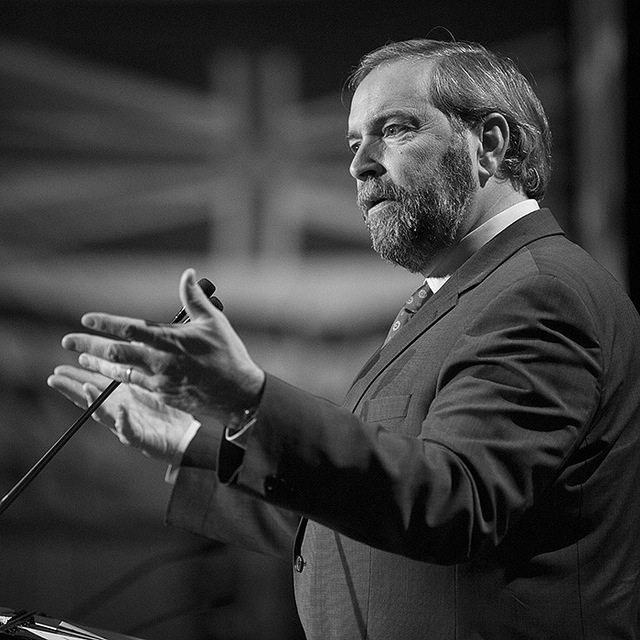Like this article? rabble is reader-supported journalism. Chip in to keep stories like these coming.
There is a building firestorm in the NDP, and, inevitably, it threatens Tom Mulcair’s leadership.
Some who push for changes in the party, such as greater involvement for the grassroots and a renewed commitment to social democratic principles, say they do not have leader Mulcair in their sights.
One senses that group has decided the current moment would not be a good time for the NDP to launch a leadership process.
For starters, the Conservatives have their own leadership change going on.
To the extent to which a leadership campaign is an opportunity to engage the public and the media as well as the party base, having a leadership campaign at the same time as the bigger and better-funded Conservative Party would be a bad idea for the NDP.
There is only so much political oxygen out there, and one can expect the Conservatives to suck up much of it for a while.
Plus, while the new Trudeau Liberal government may have a decidedly progressive hue, it will need prodding from the left if it is to fulfill such key promises as changing Harper’s anti-terror legislation and reforming the voting system.
There are large and powerful constituencies in the Liberal Party that are already quietly resisting both ideas. Canadians who want change will need a strong and determined NDP pushing hard the other way.
A leadership campaign, now, would only weaken the NDP’s ability to truly be — in the party’s current catchphrase — Canada’s progressive opposition.
That is, in fact, more than a catchphrase.
It describes the actual balance of power and influence in the House.
Liberals have a history of campaigning from the left and governing from the right
Many of us are old enough to remember the disasters that befell Canada when the left in Parliament was reduced to near irrelevancy.
Those who weren’t around then, or weren’t paying close attention, should look up the Chrétien/Martin Liberals’ fiscal record of the 1990s.
That was a time when the NDP had lost official party status in Parliament, and the main opposition came from the demagogic and opportunist separatists (the Bloc) and the populist, Reform party right.
The amorphous Liberals reacted, as they always do, to the loudest and most insistent voices, and shifted hard right.
Prime Minister Jean Chrétien and Finance Minister Paul Martin successfully abandoned both the spirit and content of their hope-filled book of election pledges.
After having promised to reinvest in basic services of all kinds, the Chrétien/Martin folks turned hard the other way, and focused almost exclusively on driving the deficit down, as quickly as possible, to zero.
In the process, they completely cut federal funding for social housing and deeply reduced funds for cultural agencies such as the CBC, just to cite two examples.
The Trudeau Liberals now, again, promise to use federal resources for all kinds of important ends, including boosting CBC funding.
But Canadians should not forget that the Liberals were almost openly hostile to the public broadcaster when they were last in power.
Get the genie back in the bottle?
History teaches that when the NDP in Parliament becomes distracted with its internal divisions — or when it is reduced to irrelevance — bad things can happen.
Those who remember the 1990s and early 2000s can attest to that.
However, some NDPers are now getting impatient.
The authors of the now-famous letter to Le Devoir did not mention Mulcair’s leadership, and — to take them at face value — have goals other than ousting the current leader.
Others, however, are much less subtle.
McGill and Concordia University NDPers have issued their own open letter, in response to the Le Devoir missive, which says:
“The many Quebecers who added their names to that letter were subtle, but we choose not to mince our words. If the NDP wants to remain relevant in Canadian politics, Thomas Mulcair must not remain as party leader.”
Those who want renewal, but for practical and tactical reasons think a leadership campaign, now, would be at best a big distraction and at worst a disaster for the party, seem to have let the genie out of the bottle.
Can they now get it back in?
Photo: flickr/ bcndp



